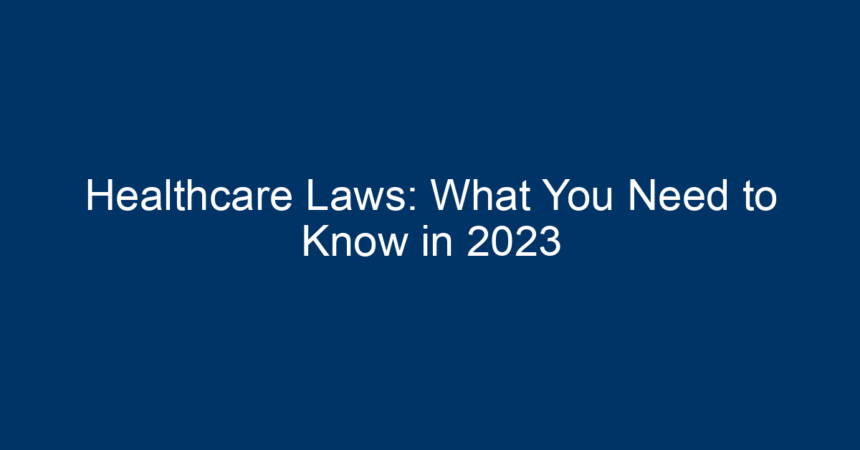In an ever-evolving healthcare landscape, understanding healthcare laws is crucial for patients, providers, and policymakers alike. With the constant changes in legislation, many individuals find themselves overwhelmed by the complexities of these laws. This comprehensive guide will navigate through key healthcare laws in 2023, their implications, and what you need to stay informed. Whether you’re a healthcare professional, a patient, or simply a concerned citizen, understanding these laws is essential for making informed decisions about health and wellness.
The Importance of Healthcare Laws
Healthcare laws underpin the foundation of our healthcare system. They regulate everything from patient rights and privacy to the standards of care providers must meet. Understanding these laws not only helps protect your rights as a patient but also ensures that healthcare providers adhere to the highest standards.
Key Areas of Healthcare Law
-
Patient Rights
One of the most crucial areas of healthcare law revolves around patient rights. These laws ensure that individuals have access to their medical records, the right to informed consent, and the ability to refuse or accept treatment. In 2023, hospitals and healthcare providers are more focused on patient-centered care, making compliance with patient rights an essential element of legal governance.
-
Privacy Laws
The Health Insurance Portability and Accountability Act (HIPAA) plays a pivotal role in safeguarding patient information. In 2023, strict enforcement continues regarding how healthcare providers manage and share patient data. Understanding HIPAA is critical for both patients and providers; it not only protects sensitive information but also outlines the penalties for non-compliance.
-
Affordable Care Act (ACA)
The Affordable Care Act, enacted in 2010, has shaped the healthcare landscape significantly. In 2023, the ACA continues to impact insurance markets and Medicaid expansion. It’s vital for individuals to understand their options for enrolling in healthcare plans, understanding subsidy qualifications, and how changes to the law can affect their coverage.
-
Medicare and Medicaid Regulations
Medicare and Medicaid are essential for millions of Americans, and understanding the laws governing these programs is crucial. In 2023, there are ongoing discussions about expanding coverage and modifying eligibility criteria. Keep an eye on new legislation that may affect out-of-pocket costs, covered services, and the length of coverage.
Emerging Trends in Healthcare Laws for 2023
As we delve deeper into 2023, several trends are shaping healthcare laws. Awareness of these trends is critical for understanding the future direction of healthcare laws.
-
Telehealth Regulations
The COVID-19 pandemic has accelerated the adoption of telehealth services, leading to a reevaluation of existing telehealth regulations. In 2023, many states have enacted or reinforced laws to expand telehealth availability, covering more services and allowing greater flexibility in provider-patient interactions. However, it’s essential for both patients and providers to understand the specific regulations in their states regarding insurance coverage and billing for telehealth services.
-
Mental Health Parity Laws
Mental health awareness has surged, leading to a push for better mental health coverage. In 2023, many lawmakers are advocating for laws that mandate mental health services to be covered at the same level as physical health services. Understanding your rights under these laws can significantly impact access to necessary mental health care.
-
Value-Based Care Models
There’s a significant shift toward value-based care, where healthcare providers are compensated based on patient outcomes rather than the volume of services. In 2023, understanding how these models can affect the quality of care you receive is essential. Familiarity with your healthcare provider’s payment structure can give you insight into the quality and type of care you can expect.
Navigating the Challenges of Healthcare Laws
While healthcare laws aim to simplify and improve healthcare, navigating these regulations can be challenging. Here are some practical tips to help you manage these complexities effectively.
-
Stay Informed
Knowledge is power. Regularly updating yourself on changes in healthcare laws can help you make informed decisions. Follow reliable health news sources, subscribe to newsletters, and participate in community forums that discuss healthcare issues.
-
Consult a Professional
Whether you’re a healthcare provider or a patient, consulting with legal professionals can provide clarity. Lawyers who specialize in healthcare laws can offer guidance on navigating complex legal issues and ensuring compliance with relevant regulations.
-
Understand Your Rights
Familiarizing yourself with your rights under various healthcare laws can empower you to advocate for yourself or your patients. Know your options regarding confidentiality, access to care, and appeal processes for denied services.
-
Document Everything
Keep thorough records of all healthcare interactions, including discussions about treatment options, consent forms, and any correspondence related to your care. This documentation can be invaluable if disputes arise.
Conclusion: Taking Action in 2023
As we navigate through 2023, the healthcare landscape remains intricate, defined by an array of regulations and laws that affect every aspect of care. From understanding your rights as a patient to the implications of new telehealth regulations, it is more important than ever to be informed.
Take proactive steps to educate yourself about healthcare laws and their impact. By staying informed, consulting professionals, and ensuring you understand your rights, you can navigate the complexities of the healthcare system with confidence. Whether you are seeking treatment, providing care, or advocating for health policy changes, the knowledge of healthcare laws empowers you to make informed choices and advocate for better care for yourself and your community.
In conclusion, healthcare laws are not merely legal jargon; they are crucial tools that can shape the future of healthcare in America. Understanding and embracing these laws will prepare you for the challenges and opportunities that lie ahead in the ever-evolving world of healthcare.




